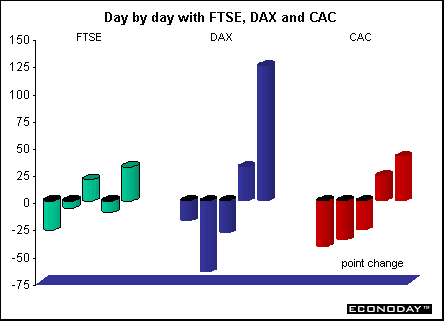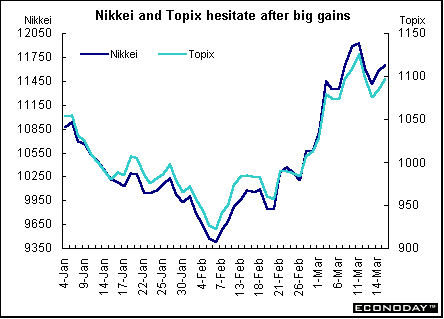 |

Europe and Britain
Trading was more muted last week as investors pondered the previous week's strong performance. Investors are worried about floundering technology stocks. Though earnings warnings are less frequent, worries have not entirely faded away. European investors were heartened by improvements in industrial production in both Italy and France and interpreted the data to mean that a recovery was underway. Despite the good news in Europe as well as the United States, the Paris CAC slipped by 0.9 percent, the London FTSE 100 was up a slight 0.1 percent and the Frankfurt DAX managed a 0.8 percent increase.

Asia
A government-engineered turnaround has catapulted the Nikkei 225-stock index 21 percent from early February, though this week saw heavy profit-taking. Part of the revival has come from a surge in the number of share repurchases by listed companies. But the biggest reason for the recovery, and for the ensuing debate, is the government's effort to stem short selling, a common practice involving bets that stock prices will fall. At the end of 2001, investors who expected Japanese stock prices to decline further outnumbered those who expected a recovery. On February 8, two days after the Nikkei closed at 9,420.85, its lowest finish since 1983, the government moved to inhibit this pessimism by adding tighter restrictions on short selling to its anti-deflation package. The Financial Supervisory Agency now prohibits brokers from selling stocks short - that is, selling shares they do not yet own - at or below the lowest available price. The effect of the moves was instantaneous. Shares in airlines, steelmakers and machinery and transport companies all shot higher as short sellers bought back shares to close their positions.

Behind the strategy is the fact that debt-laden banks are stuck with stocks valued in the trillions of yen that are counted as part of their capital base. The further stock prices fall, the larger the losses for the banks. And with the close of the financial year looming, the government wants stock prices as high as possible to stave off a crisis. Although the government often tries to strengthen stocks before the books close, lawmakers are now under additional pressure because the ending of a blanket guarantee on some bank deposits has made savers skittish. Critics say that curtailing short selling may help banks manage to get though this financial year but still does not address a fundamental issue - why do banks hold so much stock in the first place?


Last Week's Highlights • Global Stock Market Indexes • Recap of Global Markets • Currencies • Indicator Scoreboard

The Bottom Line • Looking Ahead
|
 |